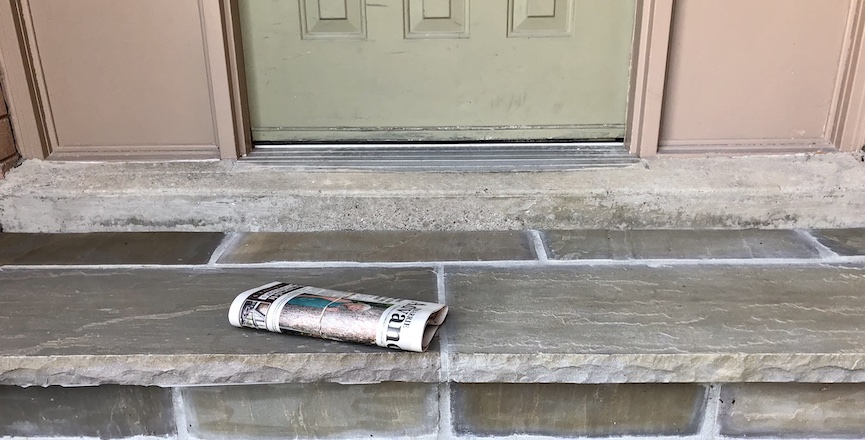This morning I picked up the copy of my local newspaper The Barrie Advance, which is delivered to my residence each week free of charge. I am familiar with the paper’s tendency to produce fluff journalism, and, more often than not, the paper goes from my front stoop directly into the recycling.
Today, I was astounded and quite frankly frustrated to see that the front and second pages of the paper were devoted to two women who opposed an affordable housing development in the lot next to theirs, all because some roots of their tree were damaged during construction. The piece highlighted a quite literal “not in my backyard” mentality to affordable housing.
What was more frustrating, however, was the fact that the ongoing federal election was entirely missing from the pages of this local paper. There was nothing at all.
A federal election is a local matter. When journalism is done well, it’s a public service. While this is not necessarily a critique of any individual paper or reporters (though it is tempting), journalists at all levels of news must approach their coverage of this federal election with a degree of care, contemplation, and a mission to inform the public about what is actually going on.
Granted, I am not familiar with this paper’s production schedule, nor with the very tiny budget they are no doubt working with to produce a weekly print paper. However, stories like the page four piece about a woman who adopted a stray cat during the pandemic, or the stories about keeping dogs cool in summer, and the best places to eat ice cream screamed up at me — or rather, made me want to scream.
Calling the SPCA for comment takes as much work as calling one of the local candidates in this riding with aspirations of governing the region.
Surely putting together some press releases from each of the candidates, and informing locals of their options, could have been done on a very slim budget and a tight deadline. (For the record, the candidates in Barrie-Innisfil include incumbent Conservative John Brassard, NDP candidate Aleesha Gostkowski, Green candidate Colin Nelthorpe, and Liberal candidate Lisa Marie Wilson.)
The front page of the paper’s website — simcoe.com — did not fare much better, with only a short story detailing the Liberal leader’s campaign stop in town yesterday, and one other election-related piece titled “6 things to know about the 2021 federal election for Simcoe County, Barrie, Orillia.” This piece went on to describe how Canada is divided into 338 electoral districts (second on the list), named the federal party leaders but no local candidates (the fourth fact), and to tie it all off, the sixth thing-to-know explained that the voting age is 18.
Local media across this country has been stripped back; its independence has been severely hampered by the need to accommodate quickly dissipating advertisers and, generally speaking, in local media and beyond, journalists are overworked and underpaid, bearing the brunt of endless cuts as the newspaper industry collapses in on itself. This is absolutely a systemic issue and not any single journalist’s fault.
However. There are still responsibilities, and consequences when those responsibilities are not carried out.
There is much discussion about how national media could better conduct its reporting on federal politics. There is, indeed, too much of a focus on often unreliable polling, and a tendency to frame campaigns as horseraces, as opposed to competing policy proposals with real-life consequences.
Coverage of any election campaign — especially one that is just five weeks long — is a mad rush, and the media industry is stretched thin. There is often little time for fact-checking politicians or approaching their statements with a critical lens. That’s not to say there aren’t good reporters out there who ask tough questions, such as Global BC’s Neetu Garcha, who recently conducted an engaging and challenging one-on-one interview with Conservative leader Erin O’Toole.
Local journalism has a role to play in fleshing out this election for the communities they report to. We will all hear about the big names, the tight races in key ridings, and speculation over whose campaign strategy is most effective and why. But federal elections need to be about the details, too. Who do you want to represent you? What are the issues they care about? How will their own life experiences inform their performance in a job they are ultimately interviewing for every time they knock on a door?
Local communities deserve the details. Without them, voters end up going to the ballot box with a party leader in mind, or are perhaps more likely to engage in strategic voting to protect the interests of a national party, rather than voting for the actual candidate they’d like to see in Parliament.
Of course, local journalism itself is struggling to survive and it’s this fact that is largely to blame. But filling pages with funding announcements and photo-ops from the local Conservative MPPs — as the Advance did today — is not how local media will persevere.
Perhaps if local newspapers aimed to make themselves an essential public service, readership would grow once more. Now is as good a time as any to try.
Otherwise, it’s a waste of paper. Perhaps the women upset about the damaged tree could think about that.
Chelsea Nash is the editor of rabble.ca and currently resides in Barrie, Ontario. Follow her on twitter at @bychelseanash
Image: Chelsea Nash/Used with permission



